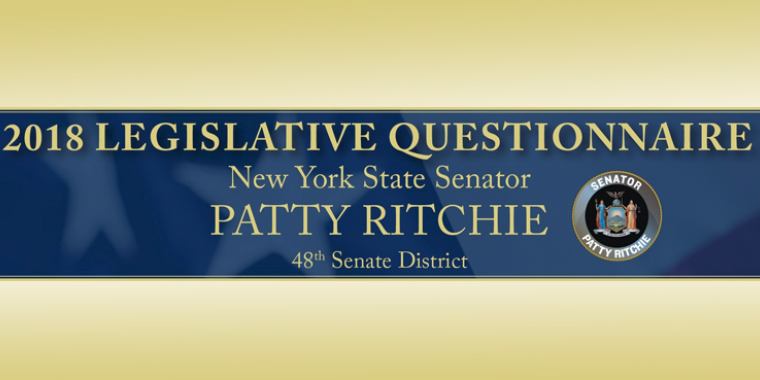
Senator Ritchie Releases Results of 2018 Legislative Survey
Brian Dwyer
February 21, 2018
-
ISSUE:
- Income Taxes
- Education
- Drugs

Strong support for making the state’s 2 percent tax cap permanent, increasing penalties for heroin dealers and promoting a proposal to help new farmers afford land are just several of the results released today from State Senator Patty Ritchie’s 2018 Legislative Survey.
In total, nearly 6,500 Central and Northern New Yorkers participated in the 15-question survey, which asked about taxes and spending, job creation, public health issues and improving public health and the state’s agricultural economy.
“I would like to thank the thousands of constituents who took the time to weigh in on the major issues that affect them,” said Senator Ritchie who represents Jefferson, Oswego and St. Lawrence Counties. “As State Senator, it’s very important to me to make sure the opinions of my constituents are accurately represented when I’m in Albany and I look forward to using the feedback gathered through this survey as I continue to stand up for Central and Northern New Yorkers in the Senate.”
Some of the key findings in Senator Ritchie’s survey results included:
- 85 percent of participants believe a new law should be passed to make the state’s 2 percent tax cap permanent;
- 83 percent of participants support a law that would permanently “cap” annual State Budget growth to 2 percent or less;
- 93 percent of participants believe that schools should offer hands-on job training and have alternative diplomas for the trades;
- 89 percent support increased fines and penalties for illegally passing a stopped school bus.
- 89 percent support increased penalties for heroin dealers and criminals who traffic in illegal drugs; and
- 52 percent believe the sale and possession of marijuana in New York State should remain illegal.
Senator Ritchie’s legislative survey represents her latest effort to call on constituents for their opinions on major issues. Previously, she has organized surveys on topics such as outdoor recreation and education as well as hosted public forums and telephone town halls on issues such as heroin abuse and synthetic drugs.
Share this Article or Press Release
Newsroom
Go to NewsroomRitchie Announces Renee Palmer as 2022 "Woman of Distinction"
September 1, 2022

Senator Ritchie 2022 Woman of Distinction
August 26, 2022


